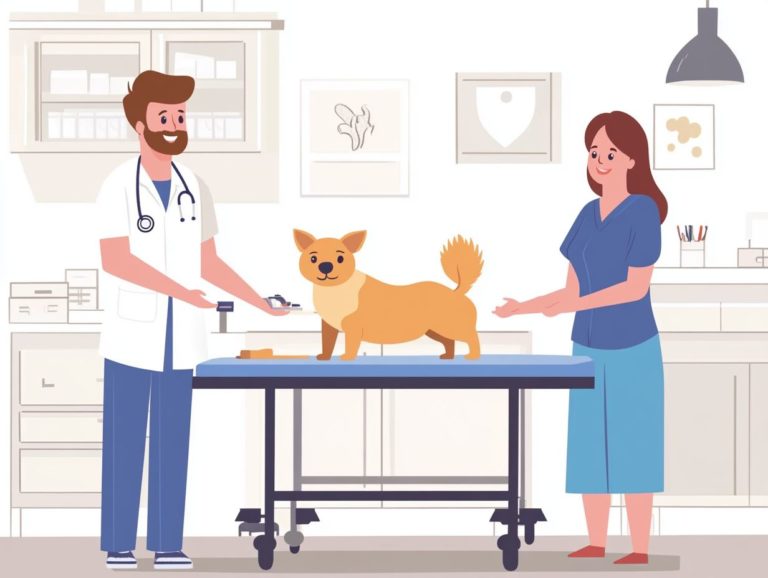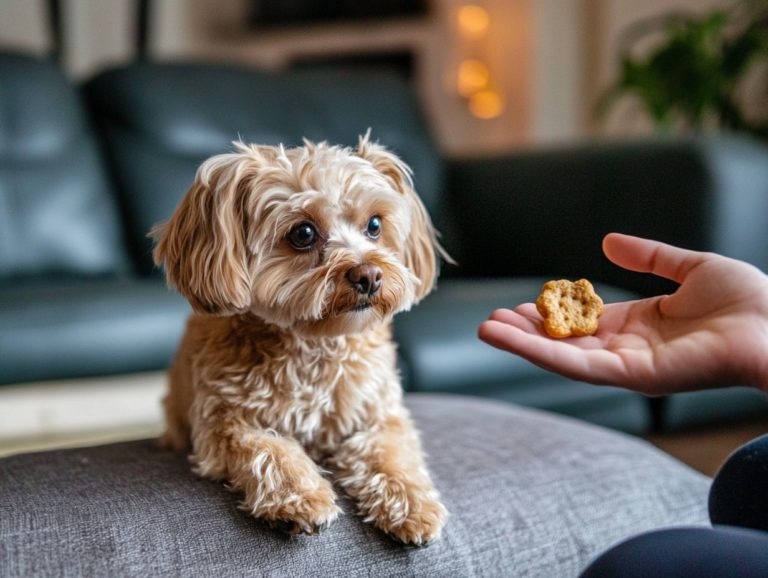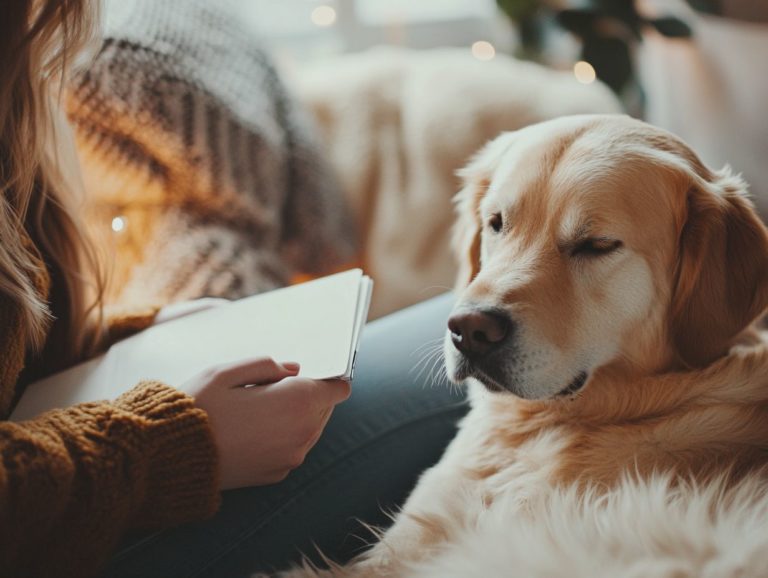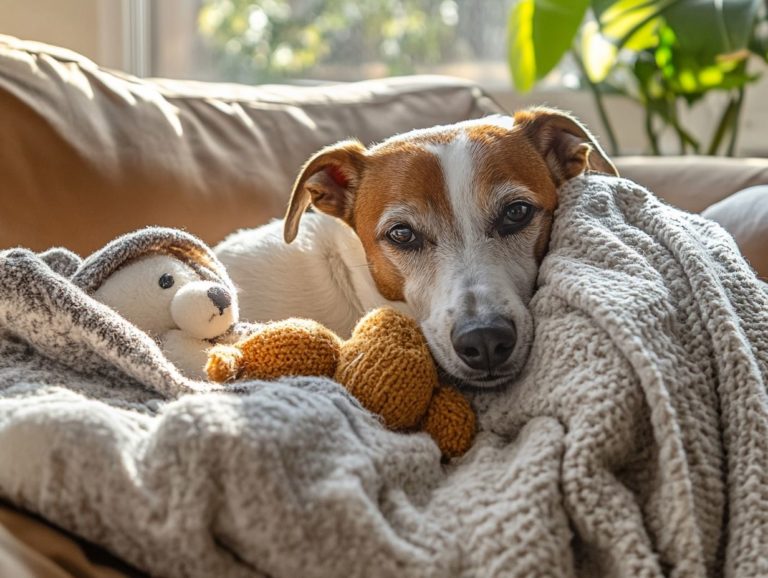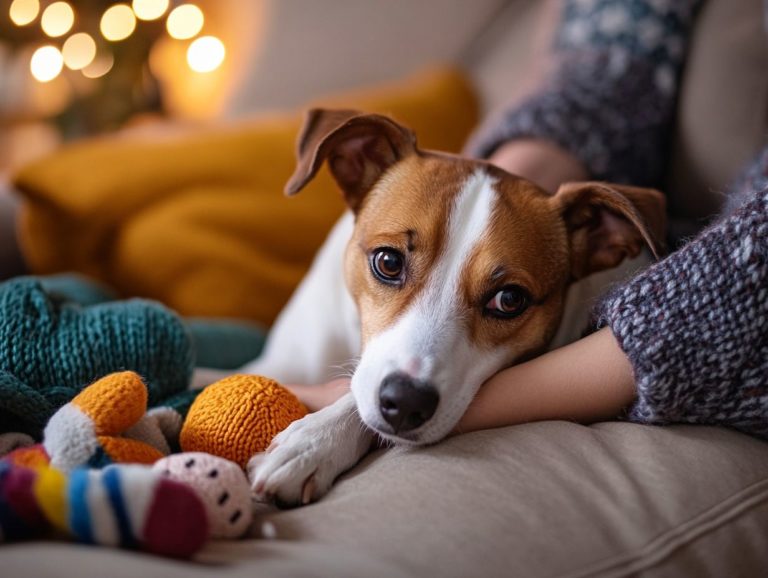What Should I Know About Therapy for Anxious Pets?
Pets, much like humans, can experience anxiety that significantly impacts their overall well-being.
Recognizing the signs and causes of anxiety in your pets is essential for ensuring their happiness and health. This article delves into the various therapies available, ranging from behavioral approaches to medication and alternative treatments.
You ll discover how to select the right method for your furry friend, whether it’s through natural therapies or medications like fluoxetine. You’ll learn what to anticipate during professional therapy sessions and practical tips for fostering a calming environment at home.
Dive in now to discover the best ways to support your anxious pet!
Contents
Key Takeaways:
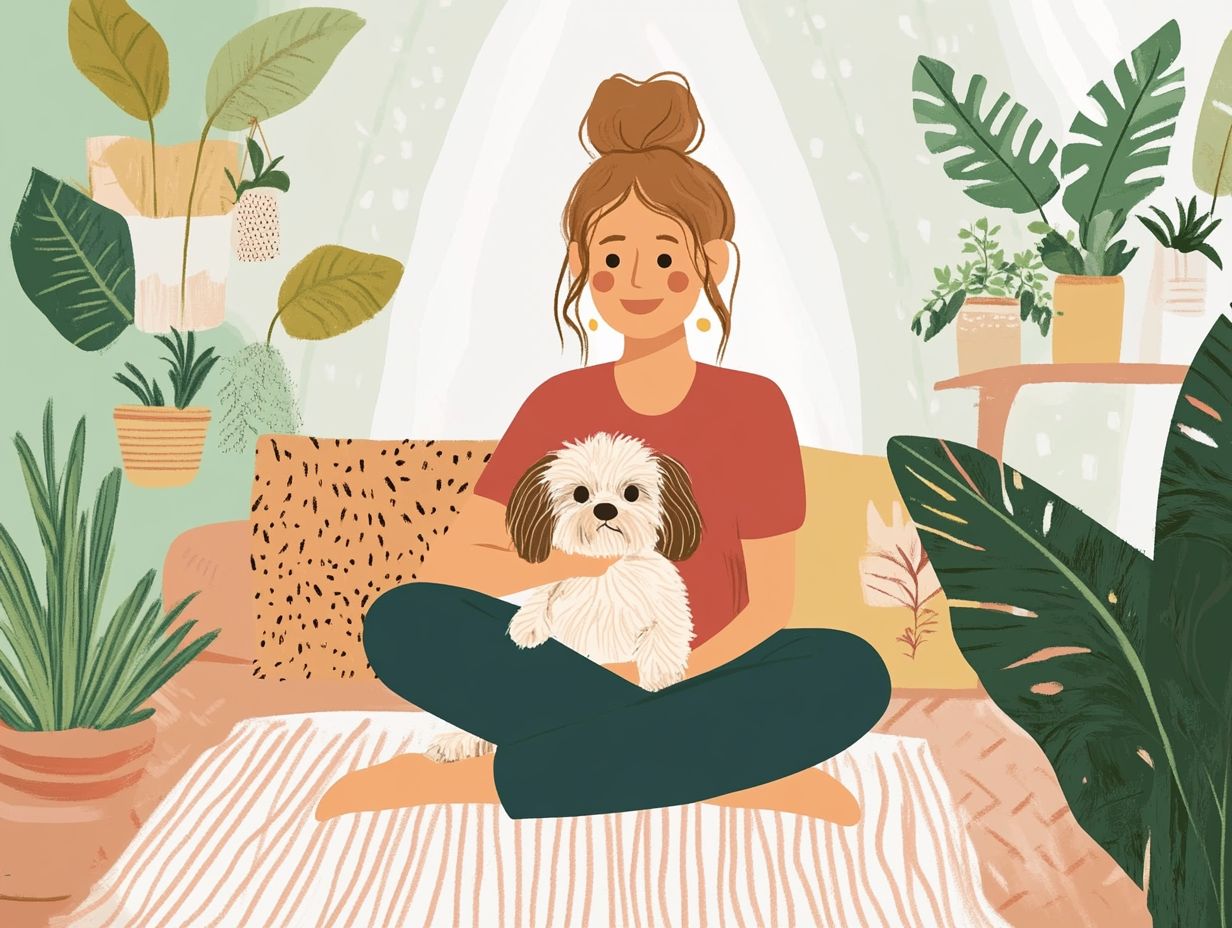
- Anxiety can significantly affect the well-being of pets, and understanding their symptoms is crucial in finding the right therapy.
- There are different types of therapy, including behavioral, medication, and alternative methods to help alleviate anxiety in pets.
- Carefully consider factors such as the severity of anxiety and your pet’s individual needs when choosing the appropriate therapy.
The Impact of Anxiety on Pets
Anxiety in pets, particularly in dogs, can significantly impact their overall well-being and behavior. This often leads to issues like separation anxiety, fear-related anxiety, and even aggression.
As a pet owner, it s essential to understand the different types of anxiety disorders that can affect your dog if you want to provide the best possible care. Familiarize yourself with the common causes of canine anxiety and watch for symptoms such as excessive barking or urination in the house.
Anxiety often increases as your dog ages, making it crucial to be aware and proactive in addressing their emotional health.
Unraveling Your Pet’s Anxiety: What You Need to Know!
Understanding anxiety in pets, especially in dogs, requires recognizing a variety of symptoms and the underlying anxiety disorders they may experience, such as separation anxiety and fear-related anxiety.
The psychological nuances of dog anxiety can arise from many experiences, including traumatic events, inadequate socialization, or shifts in their environment. These factors can manifest in observable behaviors like excessive barking, pacing, or destructive antics all signs of the distress your pet is enduring.
In terms of physical reactions, anxiety can activate a dog s fight-or-flight response, leading to increased heart rates and elevated cortisol levels.
To effectively identify and address these challenges, be attentive to your dog s behavioral cues. Provide a stable and nurturing environment, and consider seeking professional guidance or training methods specifically designed to ease your furry friend’s anxiety.
Types of Therapy for Anxious Pets
You have a range of therapy options to address your anxious pet’s needs. From behavioral therapy to medication and alternative treatments, each approach aims to create a personalized plan that caters to your dog’s unique anxiety challenges, as detailed in what your vet wants you to know about anxiety.
Behavioral Therapy
Behavioral therapy is a cornerstone in addressing dog anxiety. It focuses on modifying specific behaviors through strategies crafted by a skilled dog trainer or a veterinary behaviorist.
This approach employs various techniques designed to reshape your dog’s reaction to anxiety-inducing stimuli. Two of the most effective methods are desensitization and counter-conditioning.
For example, a trainer might gradually expose your dog to a previously startling sound, like thunder, beginning at a whisper and slowly increasing the volume. This process allows your dog to acclimate to the sound without becoming overwhelmed.
Counter-conditioning pairs the anxiety-causing stimulus with something enjoyable, such as treats or playtime, effectively altering your dog’s emotional response. Consistency in these exercises is paramount; regular practice solidifies new behaviors and helps your dog develop resilience against anxiety.
By employing these training techniques, you can significantly enhance your pet’s emotional well-being.
Medication Therapy
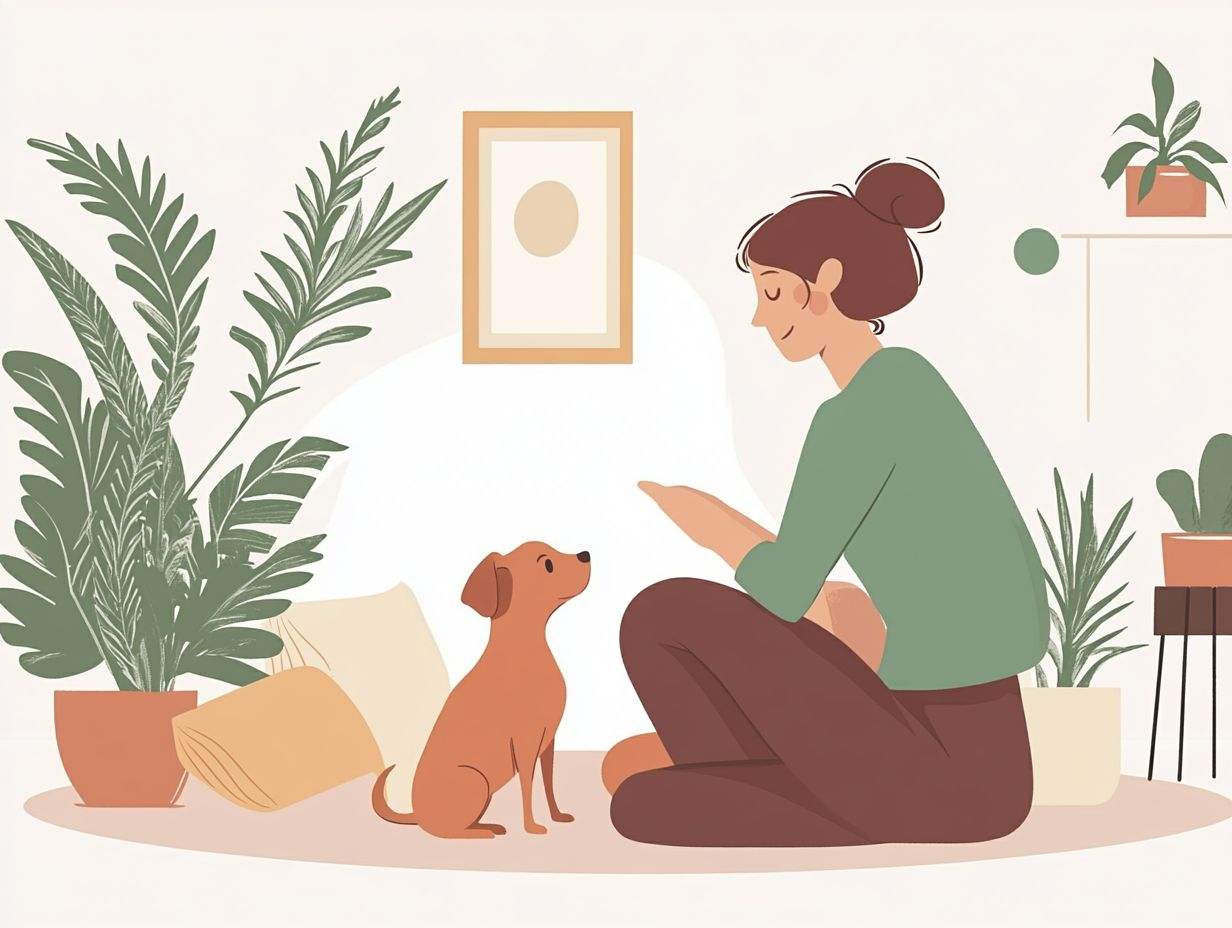
Medication therapy can effectively address your dog’s anxiety. Consider anxiety medications like Selective Serotonin Reuptake Inhibitors (SSRIs), fluoxetine, or clomipramine. These options can significantly alleviate symptoms, especially when paired with behavioral therapy.
These medications work by adjusting the balance of neurotransmitters in your dog s brain, promoting relaxation, and helping to reduce stress responses. You might also explore alternatives such as benzodiazepines and tricyclic antidepressants, which have unique mechanisms.
While these medications can enhance your dog’s quality of life, you must pay attention to potential side effects, such as lethargy, gastrointestinal upset, or changes in appetite. Collaborating closely with a veterinarian is essential to determine the right timing and dosage for your pet, ensuring continuous evaluation for treatment customization.
Alternative Therapies
Alternative therapies are increasingly popular among dog owners seeking natural solutions for their pets’ anxiety. Options like CBD oil, Adaptil calming products, and soothing techniques like classical music can significantly alleviate stress.
Many pet parents are turning to herbal remedies like Rescue Remedy, known for its calming properties and easy administration during stressful situations. Another noteworthy option is ThunderCloud, designed to offer a sense of security through its weighted design, mimicking a comforting embrace that helps ease anxious behaviors.
While these alternatives boast several benefits, including fewer side effects than pharmaceuticals, remember that they may not work for every dog. Incorporating lifestyle changes such as regular exercise, a structured routine, and a tranquil environment can significantly enhance the effectiveness of these therapies, promoting a more balanced emotional state for your beloved pet.
Choosing the Right Therapy for Your Pet
Selecting the ideal therapy for your anxious pet requires thoughtful consideration of several key factors:
- Assess the severity of the anxiety disorder.
- Determine the appropriateness of a specific treatment plan.
- Decide whether to engage a dog trainer or a veterinary behaviorist.
Factors to Consider
When formulating a treatment plan for your anxious pet, consider various factors, such as your dog s history of aggressive behavior, age, and prior experiences with anxiety.
Understanding your dog s temperament is pivotal in shaping their treatment approach. Each dog has a unique personality that influences how they respond to different stimuli. Identifying specific anxiety triggers like loud noises, unfamiliar environments, or separation from family can help you tailor techniques to foster comfort and security.
Evaluating your family dynamics, including the presence of children or other pets, is essential for determining the best support system for your anxious canine companion. Think critically about these aspects to ensure a comprehensive and empathetic treatment strategy.
Working with a Professional
Engaging with a professional be it a dog trainer or a veterinary behaviorist can profoundly elevate the treatment of your pet’s anxiety disorders. Their expert guidance and customized strategies will provide the nuanced approach necessary to effectively address your pet’s specific needs.
Is your dog struggling with anxiety? You’re not alone! Consider talking to your veterinarian today about the best options for your dog!
Finding a Qualified Therapist

Finding a qualified therapist for your anxious dog requires a thoughtful approach. This involves a thorough investigation of experienced dog trainers and veterinary behaviorists who specialize in anxiety-related behavioral issues.
This process is crucial to ensure your furry companion receives the exceptional care tailored to their unique needs. Begin by reviewing credentials; well-qualified professionals often possess certifications from respected organizations in animal behavior.
It’s also important to consider their specific experience with various types of anxiety, such as separation anxiety or noise sensitivity. Perusing client testimonials can provide valuable insights into the effectiveness of their methods and approaches.
This way, you can make a well-informed decision that prioritizes your dog’s emotional well-being.
What to Expect from Therapy Sessions
In therapy sessions with a dog trainer or veterinary behaviorist, you can anticipate a structured approach. This approach is tailored to address your pet’s specific anxiety issues through a blend of training techniques and owner education on anxiety prevention.
Throughout these sessions, various techniques will be employed, including desensitization exercises, positive reinforcement, and counter-conditioning. All these aim to foster a more relaxed mindset for your furry companion.
Your role as an owner is vital. By actively engaging in the training process, you ll learn how to reinforce desired behaviors at home and gain insights into your dog s body language.
This collaborative effort enhances the effectiveness of the therapy and strengthens the bond between you and your pet. A commitment to consistent practice and patience is essential, as gradual progress builds confidence and alleviates anxiety over time.
Tips for Supporting Your Anxious Pet
Supporting your anxious pet requires crafting a serene atmosphere within your home. Skillfully managing the triggers and stressors that may amplify their anxiety symptoms is also crucial.
By thoughtfully addressing these elements, you can foster a sense of security and tranquility for your beloved companion.
Creating a Calming Environment
Creating a calming environment for your anxious dog can be achieved through a variety of effective techniques. Consider using products like Adaptil and ThunderShirt. Don’t underestimate the power of soothing elements like classical music to set the mood.
Establishing a dedicated safe space in your home is essential. This area should be a sanctuary, free from loud noises and heavy foot traffic. Ideally, it should be adorned with soft bedding to enhance comfort.
Adding familiar toys can offer a sense of security, while calming scents like lavender can work wonders to further relax your furry friend. Engaging in gentle activities, such as slow and soothing massages, can also contribute to a tranquil atmosphere.
Establishing a routine is vital since predictability allows your dog to feel more secure. Ultimately, creating a personalized haven for your beloved companion not only addresses their anxiety but also fosters a deeper bond built on trust and understanding.
Managing Triggers and Stressors
Managing triggers and stressors is essential for minimizing your dog s behavioral issues, such as excessive barking or destructive tendencies, which often indicate anxiety.
By understanding the specific situations that provoke these reactions, you can tailor your approach. For instance, loud noises like thunder or fireworks can be particularly distressing.
Providing a safe haven with familiar scents or soft bedding can be incredibly soothing. Gradually acclimating your dog to new environments can also help ease anxiety associated with unfamiliar settings.
Pay attention to your dog s body language and reactions to different stimuli. This will guide you in pinpointing those triggers. Additionally, using positive reinforcement techniques to encourage calm behavior can significantly contribute to effectively managing their anxiety.
Frequently Asked Questions
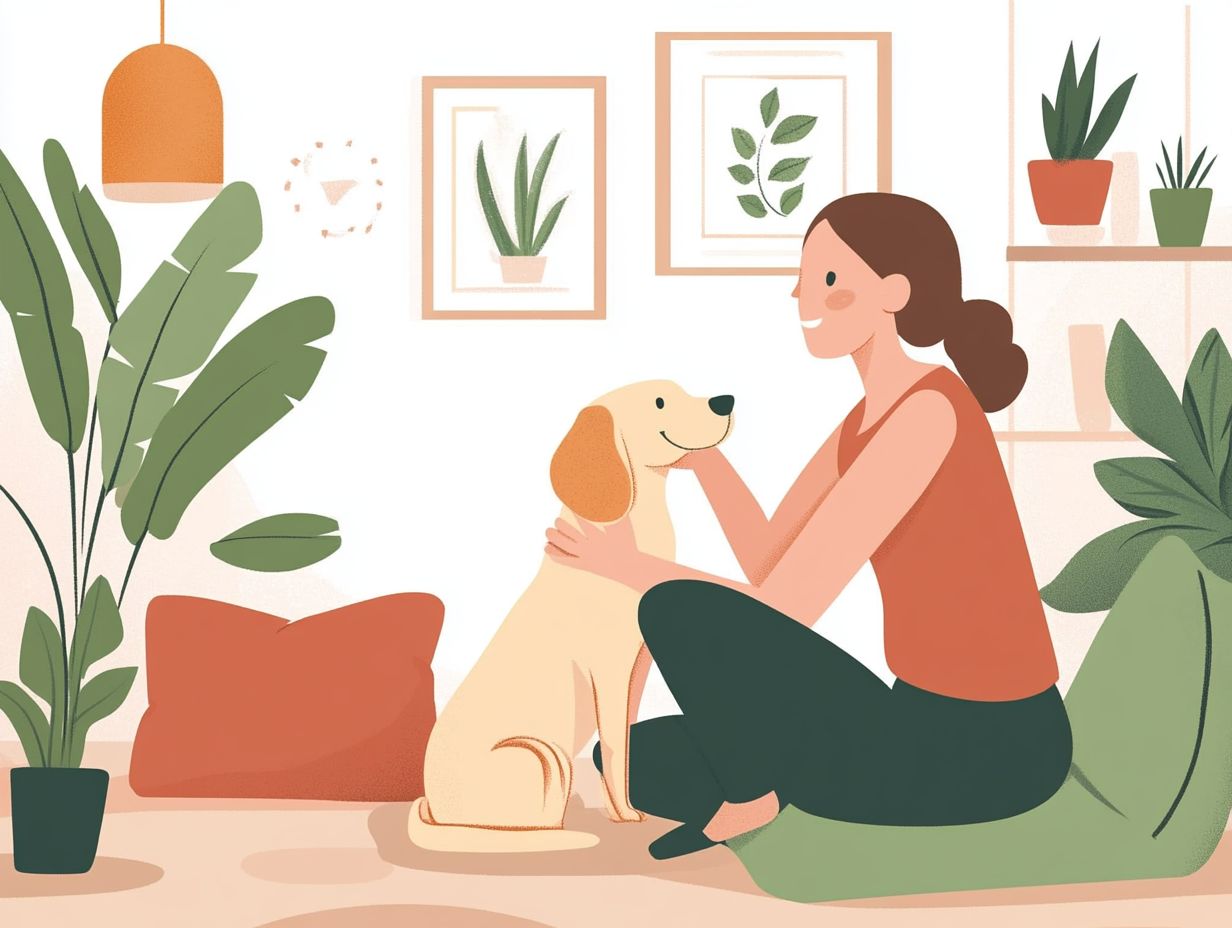
What is therapy for anxious pets?
Therapy helps pets manage anxiety and behavior problems. It uses fun techniques and exercises!
How do I know if my pet needs therapy?
Look for signs like excessive fear, aggression, or destructive behavior. If you see these, it s time to consult a vet or behavior expert!
What types of therapy are available for anxious pets?
You can explore different therapies for your pet, like training, medication, acupuncture, or relaxation techniques. The best choice depends on your pet s unique needs!
How can therapy benefit my anxious pet?
Therapy teaches your pet helpful coping skills, leading to better behavior and happiness. Plus, it strengthens your bond!
Are there any risks associated with therapy for anxious pets?
While therapy is usually safe, there can be risks. Side effects from medications or stress during training may happen. Always monitor your pet closely!
Can I do therapy for my anxious pet at home?
You can try some therapy techniques at home, like relaxation exercises and changing your pet s environment. But for more complex methods, work with a trained expert!

